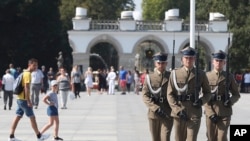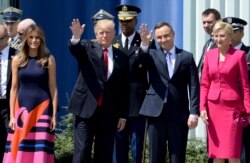Almost two dozen Polish former ambassadors are telling U.S. President Donald Trump that Poland's democracy is at risk, and urging him to use an upcoming visit to pressure the country's populist government to respect human rights and stop flouting the constitution.
“Mr. President, you are coming to a country where the rule of law is no longer respected,” the Conference of Ambassadors of the Republic of Poland wrote in an open letter posted on its website late Monday.
Trump is to arrive Saturday in Warsaw to attend ceremonies Sunday marking the 80th anniversary of the start of World War II, which began with Nazi Germany's invasion of Poland on Sept. 1, 1939. More than 40 other world leaders will also attend.
The 23 former ambassadors, some of whom have had multiple postings abroad and also held government positions at home, are also urging Trump to stop sowing divisions within the European Union and NATO, reminding him that Poland — a country in a difficult geographic position — depends on those alliances for its security and long-term survival.
“An isolated Poland, surrounded by enemies, conflicted with its neighbors and, as was the case before World War II, reliant solely on geographically distant alliances, is on course to another catastrophe,” they say.
Several critics hit back at the ex-diplomats, depicting them as frustrated former elites who cannot accept their loss of privilege and are disloyal to the nation.
One commentator, sociologist and diplomat Ryszard Zoltaniecki, told the right-wing news portal wPolityce that “they cannot accept the fact that other, new people have the right to create Polish foreign policy” and that they “slander Poland in the international arena.”
It will be Trump's second visit to Poland, where a nationalist right-wing government that shares his anti-migrant views welcomed him enthusiastically in 2017. Then, Trump gave a speech praising Poland as a defender of Western civilization, without mentioning democracy or concerns voiced often by the European Union that the young democracy was veering off course.
At the time, the government was moving to restrict judicial independence, a process that picked up speed after Trump's visit. His forthcoming visit follows recent revelations that the justice ministry encouraged an online hate campaign against judges who have been critical of the government.
It also comes as the ruling party, Law and Justice, and the country's powerful Catholic church have been depicting gays and lesbians as threats to Polish society and to families.
That appears to be a campaign ploy ahead of parliamentary elections on Oct. 13 to appeal to the conservative heartland in a country where many people cling to their traditional Catholic values and feel that they are under attack from EU membership and liberal Western mores.
“The division of powers is being dismantled and the independent judiciary is being destroyed. Human rights are curtailed, and the growing repression of political opponents and various minorities, be they ethnic, religious or sexual, is not only tolerated by the government, but even inspired by it,” the ex-ambassadors wrote. “Your powerful voice calling for tolerance and mutual respect, as well as compliance with the provisions of the Constitution and other laws, may have historical significance.”
The ruling party has repeatedly denied accusations of violating democracy, noting that it came to power in free elections and that it still enjoys the approval of many Poles. It is by far the most popular party in the country, approval that is partly explained by generous welfare policies for families and farmers.
The Conference of Ambassadors is made up of 41 ex-ambassadors who are concerned the current government is eroding democracy and hurting the country's position on the global stage. It was formed in 2017, two years after Law and Justice took power, and some of its members were fired by the party.





